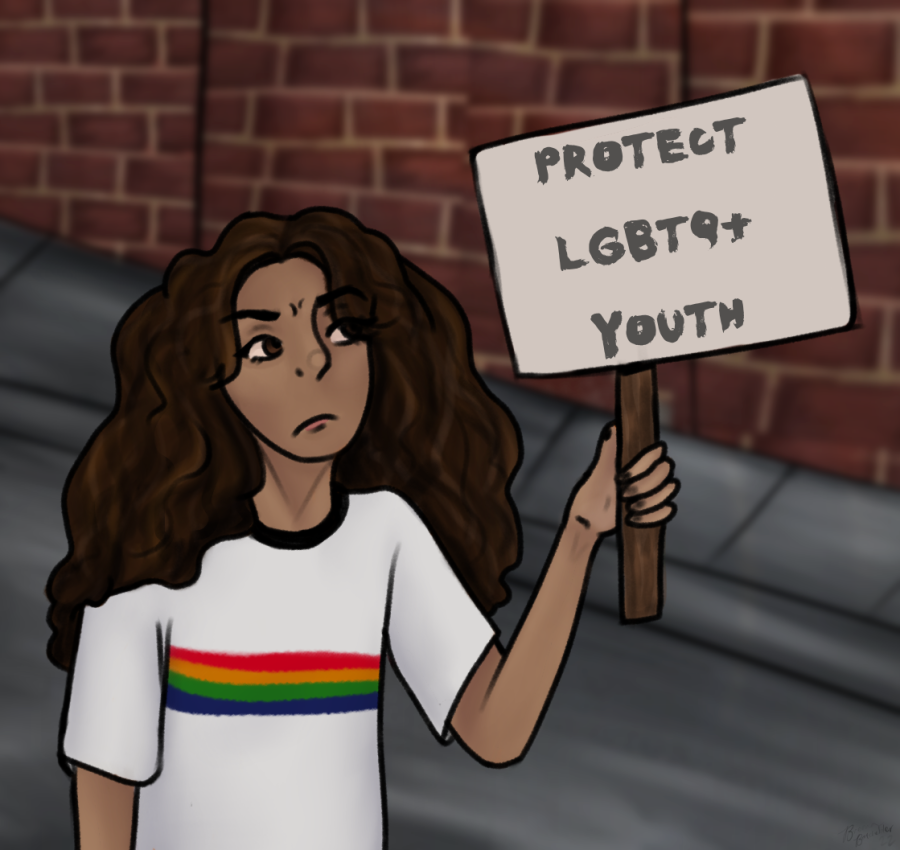Florida’s Don’t Say Gay bill is dangerous
“Anti-woke” curriculum laws are turning schools into a culture war battlefield
Students in Florida staged walkouts in early March over the state’s “Don’t Say Gay” bill, which effectively prohibits classroom instruction on LGBTQ+ topics.
March 30, 2022
Florida’s controversial Parental Rights in Education bill, dubbed the Don’t Say Gay bill, has sparked protests in the streets, on social media, in schools and even at Disney. The bill, designed to limit discussion and instruction on sexual orientation and gender identity in Florida elementary schools, is part of the culture war taking place in schools across the country.
It passed Florida’s senate on March 8 and is expected to be signed soon by Gov. Ron DeSantis. If it goes into effect, it will have monumentally harmful consequences on the safety and well-being of children across the country.
The Don’t Say Gay bill is not a response to an instance of inappropriate discussion in a classroom or to research on the dangers of discussing LGBTQ+ topics with young children. Rather, it is an attempt to restrict necessary conversations about identities and experiences that Florida Republicans want to silence. It is being passed at a time when Critical Race Theory debates, book bans and intense school board meetings about masking are dominating the world of education. The legislation’s intentionally vague language serves only to add fuel to this fire without solving any real problem in schools.
While the bill refers only to “sexual orientation or gender identity,” and does not name the LGBTQ+ community explicitly, Florida Republicans’ refusal and inability to define those terms in the legislation makes it clear who the target is. Instruction on these topics “may not occur in kindergarten through grade three or in a manner that is not age-appropriate or developmentally appropriate for students in accordance with state standards.” The provision to keep instruction “age-appropriate” means the bill impacts not just students in third grade or under, but all grades, and the vague mandate to restrict “classroom instruction” could be interpreted broadly. There is also a provision that allows for any parents who believe their child was given such instruction to sue teachers or the school; an offended parent could interpret “classroom instruction” as, for example, not allowing teachers to read books with LGBTQ+ people in it, and they could sue the school in those cases. The likely effect will be teachers and administrators walking on eggshells in the classroom and avoiding any discussion of LGBTQ+ issues or people.
Supporters of the bill claim it gives parents more control over what their kids are learning in school and prevents young children from being exposed to inappropriate content. Florida Sen. Danny Burgess argued that it “simply says that there should be an age limit on certain discussions,” while DeSantis said he wanted to “make sure that parents are able to send their kids to kindergarten without having some of this stuff injected into their school curriculum.” The priority for DeSantis, Florida Republicans, and everyone on this side of the culture war is not to send their kids to school and know they’re safe and supported, but to exercise control and power at any cost. That’s dangerous: not just for LGBTQ+ students, but for the future of education. It sets the precedent that parental control and rights are more important than LGBTQ+ children’s safety and ability to express themselves. Schools should be places for all kids to expand their understanding of the world beyond what they are learning at home, places for them to receive additional support, and places for them to encounter new people and see new perspectives.
Further, the idea that discussing gender and sexual orientation is not “age-appropriate” perpetuates the homophobic myth that LGBTQ+ people and relationships are somehow more sexual or promiscuous and less appropriate. While it’s reasonable to want to keep sex-ed age-appropriate, there is currently not any sex-ed being taught in third grade and under in Florida. All this bill will accomplish is creating a classroom culture where teachers and schools are afraid to discuss any LGBTQ+ issues or experiences at all. Young kids are largely unmonitored online, with “32% of parents of kids ages 7 to 9 report[ing] their child used social media apps” in 2021. Because of this, they are being exposed to ideas about sexuality and gender at increasingly younger ages whether parents like it or not — if not online, then from their friends who are online. It is far safer and better for them to have appropriate conversations about these topics with a teacher to facilitate and answer questions than it is for them to discuss online, at recess or in the hallways.
The bill also implicitly furthers the idea that talking about the LGBTQ+ community will somehow encourage kids to be gay. As reported by The Washington Post, Florida Sen. Dennis Baxley remarked during the legislation’s debate, while describing stories of young people coming out, that “all of the sudden, overnight, they’re a celebrity when they felt like they were a nobody.” While it is true that more teens are identifying as part of the LGBTQ+ community, this is unequivocally not an attempt for attention or fame. It is a result of a more accepting, tolerant society, and policies like the one proposed in Florida undermine the progress that has been made in making young people feel safe in expressing themselves openly.
Creating a culture where teachers are afraid to discuss LGBTQ+ issues will not make the increased risk of suicide, bullying, depression and houselessness in the community go away. Additionally, a classroom environment where kids are free to question their identity outside of what they may be assumed to be, or outside of what they may be allowed to be at home, is not a negative thing. The point of the school environment is to provide a space for kids to safely step outside of the perspectives, beliefs and ideas they are confined to at home. This is true not just of LGBTQ+ topics, but of all social, cultural and political experiences. Legislation like the Don’t Say Gay bill promotes the harmful belief that parents need to agree with every single idea their child is being exposed to outside the home. Keeping children safe is important, but sheltering them from reality is not.
Florida is not the only state advancing dangerous, anti-LGBTQ+ legislation. Fifteen other states, including Tennessee, Kansas and Oklahoma, are pushing similar legislation forward. Last year, Nebraska’s State Board of Education attempted to put voluntary sex education standards in place which would include gender identity and sexuality. These standards were shelved after controversy and “a record level of feedback” from parents and community members opposing the section of the draft which included LGBTQ+ topics. Currently, Nebraska’s sex education emphasizes abstinence, despite exhaustive research that this does nothing to prevent STDs or teen pregnancy, and it lacks any comprehensive material on LGBTQ+ relationships, experiences or contraception. Nebraska should look at Florida as an example of what to avoid in education: a dystopian school system where LGBTQ+ kids are ignored completely and taught to keep quiet about their identity. Millard students, and students everywhere, deserve better than that.
The Don’t Say Gay bill is dangerous, not just for Florida, but for all of American education. Schools should not become just another method of control for parents. The priority should not be limiting what students are learning about or controlling what support they can receive. It should be teaching them and, most importantly, keeping them safe.Students







